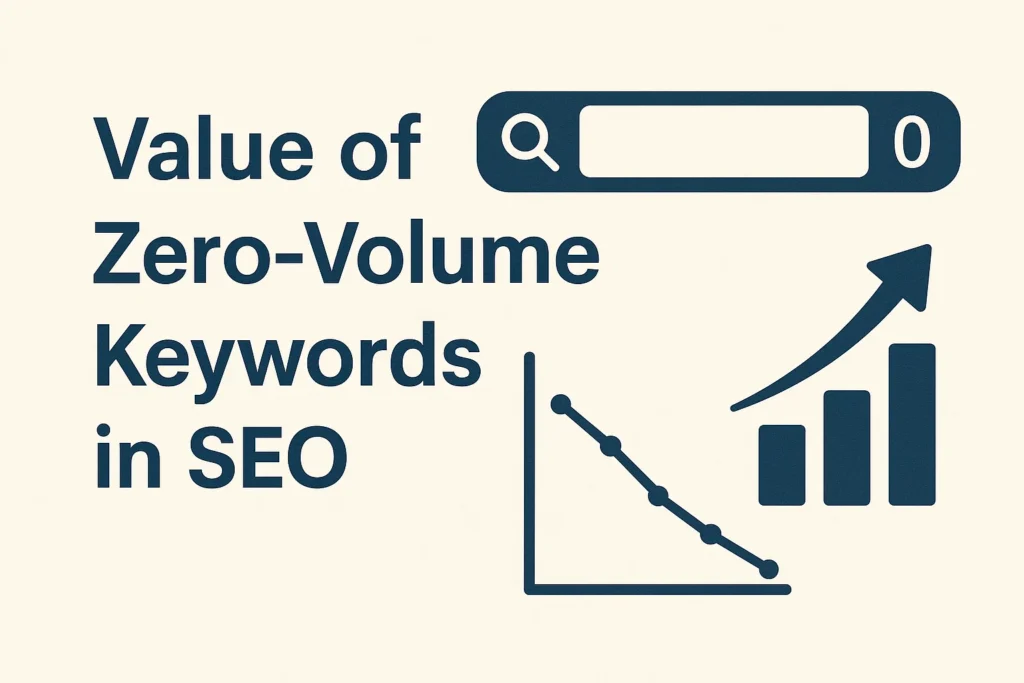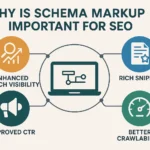I’ve done it. You’ve probably done it, too. As SEOs, as marketers, as business owners, we get completely obsessed with the big, flashy numbers. We log into our favorite keyword tool, set that filter for “10,000+ monthly searches,” and just dream of the traffic wave that will hit when we rank number one. We chase those vanity metrics, those huge keywords that promise instant stardom.
But what if that entire approach is just… wrong?
What if the biggest, most valuable opportunities aren’t in those roaring stadiums packed with high-volume terms? What if they’re in the quiet, empty-looking alleyways that all the tools just label “zero”?
This is the hidden world of zero-volume keywords. And for those of us who are willing to actually go exploring there, the rewards are staggering.
I know what you’re thinking. “Why would I ever spend my time—my most valuable resource—creating content for a search term that nobody is even looking for?”
It’s a fair question. But the whole premise is flawed.
The tools are not telling you “nobody” is searching for it. They are telling you they don’t have enough data to give you a solid number. And right there, in that gap between the data and the reality, lies a massive competitive advantage. Understanding the true value of zero-volume keywords in SEO isn’t just another tactic; it’s a complete, fundamental shift in how you have to see your content, your customer’s intent, and your entire business.
This is the secret strategy that graduates you from being a content-producing machine to being a problem-solving authority.
And I’m going to show you exactly how it works.
More in Keyword Research Category
How To Find Commercial Intent Keywords
What Are Navigational Keywords
Key Takeaways
- “Zero-Volume” Isn’t “Zero Traffic”: It just means the search volume is too low for the SEO tools to measure accurately, or perhaps the term is brand new.
- Intent Beats Volume, Every Time: One single searcher with a hyper-specific, “ready-to-buy” problem is infinitely more valuable than 1,000 casual browsers.
- Your Best Keywords Aren’t in Tools: You’ll find these “golden zeros” hidden in your customer support tickets, your sales call notes, deep in forum threads, and in the “People Also Ask” boxes.
- Build Unbeatable Authority: Answering these ultra-specific questions is the clearest way to demonstrate true expertise (the “E” in E-E-A-T) and build a defensive moat your competitors can’t cross.
- It’s a Marathon, Not a Sprint: This strategy won’t deliver a flood of traffic overnight. It delivers a small, consistent, and growing stream of highly qualified leads and builds unbreakable trust.
So, What Does “Zero-Volume” Actually Mean?
First things first, let’s get this straight. You type a long, specific, multi-word phrase into Ahrefs or Semrush. The tool spins for a second and spits back a big, fat “0” or “N/A.”
Your brain immediately translates that to “no one.”
That’s the wrong translation.
What it actually means is that, within their massive data-sampling models, the tool just couldn’t confidently estimate a monthly average. It could mean 5 people searched for it. It could mean 20. It could even mean it’s a brand-new term that 500 people are going to search for next month after a new product launch.
That “zero” is an admission of a data blind spot. It is not a declaration of non-existence.
Think about it. We’re talking about tools that are trying to model the search behavior of billions of people. They have to draw a line somewhere, a “minimum threshold” for their reporting.
Are SEO Tools Just… Wrong?
Well, yes and no. They are absolutely incredible for estimating broad trends and understanding general search intent. I use them every single day. But they are notoriously bad at one specific thing: the true long-tail.
The “long-tail” isn’t just keywords with three or four words. The real long-tail is that massive, near-infinite collection of unique, specific, and often first-time-ever search queries. These are the questions we type into Google exactly as we think them in our own messy, human way. They are conversational. They are specific.
SEO tools are built to analyze the “head” (big terms) and “body” (medium terms) of the search demand curve. They just aren’t built to map the endless “tail.”
Their data comes from clickstream panels, which take a sample of internet users. If a term is only searched 10-20 times a month, the statistical chance of it showing up in that tiny data sample in a measurable way is minuscule. The tool has no choice. It rounds down to zero.
Why Can’t Tools Track Every Single Search?
The sheer scale, for one. Google itself has stated that 15% of all daily searches are queries it has never seen before.
Billions of searches. Every day. And 15% are brand new.
Let that sink in for a second.
How can a third-party tool possibly catalog, model, and assign a volume number to a query that has never existed before today?
It can’t.
Furthermore, search behavior is complex. It’s not a simple one-and-done event. Researchers, like those in this Cornell University study on search behavior, have shown that people constantly refine, rephrase, and alter their queries as they go. A single person’s journey to an answer might involve five different “zero-volume” searches. They are all looking for the same thing, but their unique phrasing shatters the “volume” into tiny, undetectable pieces.
So, when you see “zero,” you shouldn’t think “no one.”
You should think “untapped.”
How Did I Stumble Upon This “Secret”?
I’ll be honest. I didn’t read this in some marketing textbook. I found it by accident, born from a mix of sheer desperation and a very demanding client.
I was working with a client in a hyper-niche B2B industrial automation space. I mean niche. These guys sold highly specialized components for high-speed manufacturing lines. Their marketing manager, a brilliant (and very literal) engineer named Frank, was getting frustrated with me.
“All your keyword reports show zero,” he’d say, tapping the printout. “But my customers are asking me about ‘troubleshooting Allen-Bradley PLC handshake failures with FANUC robots’ all the time on the phone.”
I checked my SEO tool. That exact phrase? Zero searches. Not 10. Zero.
Frank was persistent. “Just write the article,” he said. “I’ll give you all the technical details. I don’t care about your tool. I care about my customer.”
So, I did. We wrote the most in-depth, specific, “engineer-to-engineer” article you could possibly imagine. We used the exact phrasing from his customer emails. We didn’t “optimize” it for some broader, bigger “head” term. We just answered the question.
And my tool was right. The article got almost no traffic. Maybe 10-15 visits a month. I chalked it up as a failure.
Three months later, Frank calls me. He’s ecstatic. “That article you wrote? We just closed a $250,000 deal. The lead came directly from that post. The engineer told our sales guy he Googled his exact problem, we were the only answer on the internet, and he trusted us immediately.”
That was my lightbulb moment.
Why Did This “Zero-Search” Post Work So Well?
It was never about volume. It was about intent and authority.
One single searcher, with one “impossible” problem, found one perfect answer. The value of that one visitor was a quarter of a million dollars. I would need to rank #1 for a 50,000-search-volume “head” term and convert at an insane rate to even come close to that kind of ROI.
The value of zero-volume keywords in SEO isn’t measured in traffic charts. It’s measured in qualified leads, closed sales, and the kind of authority that makes you the only logical choice.
That experience completely changed my approach. I stopped asking the tools “What are people searching for?” and started asking my clients “What are your customers asking you?”
If the Volume is Zero, Where’s the Value?
The B2B client story is a perfect, dramatic example, but the value here is much broader. It really breaks down into a few key areas that are critical for any business that wants to do more than just float online.
You have to shift your entire mindset from “traffic generation” to “problem-solving.”
Are You Capturing Hyper-Specific, High-Intent Buyers?
This is the big one. This is the most direct value. People who search for long, complex problems are not just browsing. They are not “top-of-funnel.” They have a serious problem that is costing them money right now, or they have a credit card practically in hand.
- Low-Intent: “best running shoes” (110k/mo)
- High-Intent: “best running shoes for overpronation on trail marathon” (0/mo)
Who is more likely to buy today? The person searching that second query is already an expert consumer. They’ve already eliminated all the basic options. If you are the only one who bothers to answer their exact, specific question, you haven’t just earned a click. You’ve all but earned a sale.
Can You Become the Only Answer to a Critical Question?
This is about creating a total monopoly on a micro-niche. When you create content for a high-volume keyword, you’re just one of 20 articles on the first page all saying pretty much the same thing. You’re a commodity.
But when you write the definitive guide to “how to integrate Stripe’s API with a legacy ColdFusion application,” you might literally be the only answer on the entire internet.
That is digital dominance. You aren’t just ranking #1. You are the search result. This builds a staggering amount of authority. Google’s E-E-A-T (Experience, Expertise, Authoritativeness, Trustworthiness) guidelines are built to reward this. What better way to prove your “Experience” and “Expertise” than by answering a question no one else even bothered with?
What About Answering Questions Before They Become Search Trends?
This is the “pre-search” strategy. Every major trend, every new product, every industry shift… it all starts as a collection of “zero-volume” queries. When a new piece of tech or a new cultural idea emerges, people have questions. The SEO tools won’t pick up on this for months.
But if you are on the front lines of your industry, you can anticipate these questions. You can listen to the chatter on social media, in private Slack communities, or at industry events. Then, you can write the answers before they have a measurable search volume.
When that trend finally hits and the volume explodes, who do you think Google will see as the original, foundational authority?
You. You were there first. This is how you build an authority that is almost impossible for late-coming competitors to dislodge.
How Does This Build a ‘Defensive Moat’ Around Your Expertise?
Think of your content library as a castle. Your high-volume “pillar pages” are the tall, obvious towers. Everyone can see them, and everyone is trying to attack them.
Your “zero-volume” articles? Those are the hidden traps, the secret passages, the boiling oil, and the specialized defenses inside the castle walls.
A competitor can easily decide to “steal” your “Ultimate Guide to Email Marketing” keyword. It will take them time and money, but it’s a straightforward assault.
But… will that same competitor spend a week writing a 2,000-word, highly technical article just to steal your 10-visit-a-month “zero-volume” keyword?
Never.
The ROI isn’t obvious to them. They can’t justify the resource cost to their boss. By building out a library of this hyper-specific content, you create an authority moat that is simply too deep and too much work for a surface-level competitor to replicate. You are, quite literally, in a league of your own.
Where Do You Even Find These “Invisible” Keywords?
This is the fun part. This is where you have to stop being an “SEO” and start being a detective. Your best clues are not hiding in any software. They are in the real, unfiltered language of real human beings.
Your goal is to find pain points, not keywords.
Isn’t “People Also Ask” a Goldmine?
Yes. It absolutely is. This is Google handing you a treasure map for free. Go to Google, type in one of your broader “head” terms, and look at the “People Also Ask” (PAA) box.
Click on one of the questions. More will appear.
Keep clicking.
You are literally watching a searcher’s mind at work, a journey of progressive query refinement. Go four or five “clicks” deep into that PAA rabbit hole, and you will find some incredibly specific, long-tail, “zero-volume” questions that real people are asking Google.
Each one of those is a potential H2 or H3 for a larger article, or it’s a fantastic standalone article all on its own.
Have You Scoured Your Own Customer Emails and Support Tickets?
This should be source number one. It is pure, unadulterated gold. You are already paying your support team to answer customer questions all day long. Why in the world are you not turning those answers into public-facing, lead-generating content?
Set up a simple shared document with your sales and support teams. Create a process. Ask them to paste in every single good, specific question they get. Look for patterns. But also, look for the weird, one-off, super-technical questions.
- “How do I clean the main filter on the Model 3B?”
- “Can your software import a .DAT file from a 1998 database?”
- “What’s the real difference between your ‘pro’ plan and ‘enterprise’ plan for a team with 50 users who are in 3 different countries?”
These are not “keywords.” They are customer problems. Go solve them.
What Are Your Competitors’ Comment Sections Saying?
Your competitors are doing you a huge favor. Go to their blogs, especially their big, high-traffic “pillar” articles. Scroll right past the article itself and read the comments.
What are people asking? What is the article missing? The comments section is a goldmine for finding the gaps in your competitor’s content.
If a reader posts a long, detailed, frustrated question in the comments, it means they Googled their problem, didn’t find a direct answer, landed on your competitor’s related-but-not-specific-enough article, and are still looking for help.
That is your opportunity. Go write the definitive article that answers that specific comment.
How Can Forums like Reddit and Quora Help?
Forums are the unfiltered, raw voice of the public. People do not use “SEO keywords” when they post on Reddit. They use real, pained, natural language.
Go to a subreddit related to your industry (e.g., r/photography, r/personalfinance, r/woodworking). Search for phrases like “how do I,” “can’t figure out,” “problem with,” or “what’s the best way to.”
You won’t find high-volume keywords. You’ll find entire paragraphs of frustrated, detailed problems. These are some of the most powerful “zero-volume” topics on the planet. Answering them using the user’s exact language builds an almost-instant, powerful connection.
How Do You Weave These Keywords into Your Content Plan?
Okay, so you’ve done your detective work. You have a list of 50 “golden zeros.” Now what? You can’t just write 50 tiny, disconnected articles and hope for the best. You need a real strategy.
This is where you put your “SEO” hat back on and merge it with your “detective” findings.
Should You Write a Whole Article for One “Zero-Volume” Phrase?
Sometimes, yes. Absolutely. My B2B client story is a perfect example. If the question is complex, and the potential value of the person searching for it is high, it absolutely deserves its own dedicated, in-depth article.
This is a “surgical strike.” You’re not trying to catch a lot of fish; you’re trying to catch one specific, very valuable whale.
I did this on my own personal blog. I had a very specific, technical audio routing problem with my Rodecaster Pro mixer. It was driving me nuts. I finally figured it out after two straight days of troubleshooting. I knew other people must have this exact problem. I wrote a simple 500-word post titled “How to Fix the [My Specific Problem] on the Rodecaster Pro.”
That post gets maybe 5-10 visits a day. But every single comment on it is “YOU SAVED ME!” or “I was about to return this $600 piece of gear, thank you!” That one little post built more authority and trust with my niche audience than any 3,000-word “ultimate guide” ever could.
Or, Can You Use Them to Build an Unbeatable Topic Cluster?
This is the more common—and often more powerful—strategy. You use your “zero-volume” keywords to build the most comprehensive, authoritative topic cluster imaginable.
Here’s the model:
- The Pillar Page: This is your big, high-volume topic. Example: “A Beginner’s Guide to Landscape Photography.”
- The Cluster Content: These are your supporting articles that answer specific, related questions.
- The “Zero-Volume” Advantage: Instead of just guessing at cluster topics, you use your “golden zero” list. Your cluster doesn’t just include “Best Lenses for Landscapes.” It includes:
- “How to prevent lens flare when shooting a sunrise”
- “What is the best ISO setting for waterfall photography with long exposure”
- “Focus stacking techniques for a sharp foreground and background in landscape”
These “zero-volume” topics can become the H2s and H3s within your pillar page, or they can become their own individual “spoke” articles that link back to the main “hub” page.
Now, when Google crawls your topic cluster, it doesn’t just see another generic “Beginner’s Guide.” It sees a comprehensive resource that answers the main question and all the tiny, specific, expert-level follow-up questions. This signals massive, undeniable topical authority.
How Does This Strategy Impact Your E-E-A-T?
It’s a direct injection of “E” (Experience) and “E” (Expertise).
You simply cannot write a useful article about “troubleshooting Allen-Bradley PLC handshake failures” unless you have actual experience and expertise. You can’t answer that hyper-specific question from a Reddit thread unless you are a genuine expert.
Faking this is impossible.
While your competitors are hiring generalist writers to pump out 10-point listicles on high-volume keywords, you are creating a library of content that proves you are a master of your craft. Google is actively, desperately looking for these signals. It wants to rank content from authors who have demonstrable, real-world experience.
These “zero-volume” posts are your proof.
Is This Strategy a “Silver Bullet” for Everyone?
I have to be honest. No. This strategy is incredibly powerful, but it has prerequisites. It is not a “get rich quick” scheme for a brand-new website.
It’s a “get rich slow” strategy. A “build a real, lasting business” strategy.
Why Won’t This Work for a Brand New Website?
A site with zero authority (a Domain Rating of 0) will struggle to rank for anything, even a “zero-volume” term with no competition. Google doesn’t trust you yet. You have to earn that initial layer of authority first.
Focus on your foundational content, try to get a few good links, and establish your brand. Then, once you have some topical authority, you can start weaving in this strategy. This is an accelerator, not an ignition switch.
That said, a new site should start collecting these keywords from day one. Build your future content plan around them, even if you can’t rank for them yet. It’s the right foundation to build on.
How Do You Measure the ROI of “Zero”?
This is the question that stops most marketing managers from ever approving this strategy. The answer is: you have to change your measurement tools.
You cannot measure the success of this strategy with a “Total Traffic” graph in Google Analytics. You will fail every time.
Instead, you have to measure success with a completely different set of metrics.
- Lead Quality: Are the few leads you get from these posts more qualified than your general traffic?
- Conversion Rate: Does the traffic from these articles convert at a (much) higher rate? (Hint: it almost always does).
- Sales Cycle: Do these leads close faster because they already trust you?
- Anecdotal Feedback: What are people saying? Track the “You saved me!” comments. Track the “shout-outs” you get on sales calls.
- Time on Page / Engagement: Are people actually reading the whole thing? A high time-on-page for a low-traffic article is a massive success signal.
This is about quality, not quantity. You have to be willing, and able, to report on that.
What’s the Real Cost of Ignoring These Terms?
This is the question I always ask my clients. What is the cost of not answering your customer’s most specific, urgent questions?
It’s not zero.
The cost is a missed $250,000 contract. The cost is a frustrated customer who churns. The cost is a potential brand advocate who gives up and goes to a competitor. The cost is looking like a surface-level generalist in a world that rewards deep experts.
The value of zero-volume keywords in SEO is a strategic-level conversation, not just a tactical one.
Is This “Secret” Just Going to Get More Important?
Yes. 100% yes. Everything about the future of search is pointing directly in this direction.
How Do AI Overviews and SGE Change the Game?
Google’s AI-powered search (Search Generative Experience, or SGE) is designed to synthesize information and provide one “correct” answer.
Where do you think that AI is going to find the best answer to a complex, multi-part, nuanced question?
It’s not going to get it from a generic 10-point listicle. It’s going to find the specific answers to the specific parts of the query. It will stitch together answers from the most authoritative, in-depth, experience-driven sources it can find.
If you are the only one on the internet with a detailed answer to a specific “zero-volume” part of that query, you are providing the critical raw material for that AI answer. You are positioning yourself to be the cited source. While everyone else is getting blended into a generic AI paragraph, your experience-driven content stands out as a unique, citable resource.
Why is Voice Search Still a Factor?
We don’t speak to our smart devices in “head” terms.
We don’t say, “Siri, weather.” We say, “Siri, what’s the weather going to be like on Saturday afternoon in downtown Austin?”
We don’t say, “Alexa, pasta recipe.” We say, “Alexa, find me an easy pasta recipe that doesn’t use any dairy and takes less than 20 minutes.”
These are “zero-volume” keywords. Every single one of them. As search becomes more and more conversational—driven by voice and AI—the “long-tail” is becoming the entire tail. The businesses that already have a library of these conversational, specific answers will be the ones that win.
The Real Secret: Stop Chasing, Start Answering
For too long, many of us have let SEO tools dictate our content strategy. We’ve chased the volume, the traffic, the vanity.
The true value of zero-volume keywords in SEO is that it forces you to do the one thing that actually matters: listen to your customers and solve their problems.
It’s a strategy built on empathy. It’s a strategy built on real-world experience. It’s a strategy that builds a real brand, not just a traffic graph.
This isn’t just about SEO. It’s about becoming the most helpful, trustworthy, and authoritative voice in your space. The “secret” is that there is no shortcut. The secret is to do the hard work of answering the hard questions that everyone else is ignoring.
Go find your zeros. The traffic will be small, but the impact will be massive.
FAQ
What does ‘zero-volume’ mean in SEO context?
‘Zero-volume’ in SEO refers to keywords or search terms that return a volume of zero or ‘N/A’ in keyword tools, which means these tools cannot confidently estimate the search count. It does not mean nobody searches for them, but rather that the data is not available or the search volume is too low for measurement.
Why are zero-volume keywords valuable despite having low or no measurable search volume?
Zero-volume keywords are valuable because they often reflect hyper-specific, high-intent questions from potential customers. These queries can lead to highly qualified leads and establish your authority in niche areas, providing a competitive advantage that isn’t measured by traffic alone.
How can I find these ‘invisible’ keywords that tools don’t show?
You can discover invisible keywords by examining ‘People Also Ask’ boxes on Google, analyzing comments in forums and competitor comment sections, and reviewing customer support tickets and emails to identify detailed, specific problems and questions that your audience has.
How should I incorporate zero-volume keywords into my content strategy?
Zero-volume keywords should be used to create highly targeted, detailed content that answers specific questions or problems. They can be developed into individual articles or part of a comprehensive topic cluster, demonstrating expertise and building a solid authority that search engines will recognize.
Can focusing on zero-volume keywords help in building a defensible market position?
Yes, by creating a library of detailed, specific content for zero-volume keywords, you build an authority moat that is difficult for competitors to replicate, thereby establishing digital dominance and a defensive strategy around your expertise.




